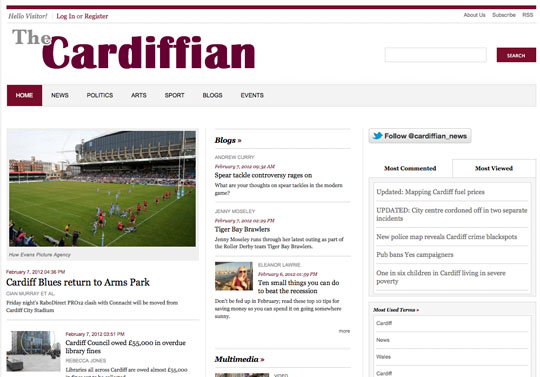
Image by Wiertz Sébastien on Flickr. Some rights reserved.
This is the first of a number of features over the summer break looking at the challenges that trainee journalists face and the opportunities that may present themselves.
Danny Roberts is a sports journalism student at Leeds Trinity University College and tweets from @DannyRoberts74. In the post below and others to follow in the coming weeks he hopes to help people, through his own experiences and those of professionals, to further their study and get that little bit closer to becoming a successful journalist.
What is the most daunting thing for a student journalist? Being told that ‘it is a tough business’, ‘you may not make it’ and ‘you aren’t going to make much money’.
What I think you must do first is reject the notion that you are destined to fail. No matter what anyone tells you, if you are driven then you can get the opportunities you want and deserve. In a field that requires experience more than a degree level qualification you need to put yourself out there and experience the world. The next thing you should do is realise that you can work as a journalist now.
People train as journalists for many different reasons, many people are born into the trade with a full book of contacts, some have always wanted to write for the public, whereas others just want to follow celebrities around all day. It doesn’t matter what aspect of journalism you wish to work in, the knowledge you must have rarely differs.
The first thing I was taught about journalism was ‘read the news’. Whether you read the news online or buy a daily newspaper, it is important to know what is going on in the world around you. If you go into a job or placement interview in the future and they mention the news and you go silent, it isn’t a good first impression. It doesn’t matter if you don’t intend to go into news writing or not, being an avid reader of all things news helps you to further progress as a journalist.
Having a contact book is the next step on your way to success. It is never too early to start building relationships with people and companies from all walks of life, as you never know when you will need a quote or story from these contacts. This could be a ‘little black book’ or a huge pad, either way get them written down. You could use your phone to add these contacts to, but it is always a good idea to have a paper copy because phones can be so easily damaged or lost.
If you haven’t already, pick a specific aspect of journalism. Of course it may be good to be flexible and know a bit about each, but having a niche topic to write about will help your chances of becoming accepted and excelling as a journalist in your chosen field. To add to this idea, if you don’t have a specific field you should always remain open to different experiences and challenges as you never know what might take your fancy.
What else can you do? Start to hone your communication skills, learn to use the phone as well as email (they have to reply if you are speaking to them live), be open to rejections, read pieces by your favourite writers, don’t be afraid to ask questions, pitch ideas to editors, the list is endless.
Over the next few months, this blog will help to share experiences and offer advice and support to other trainee journalists.
